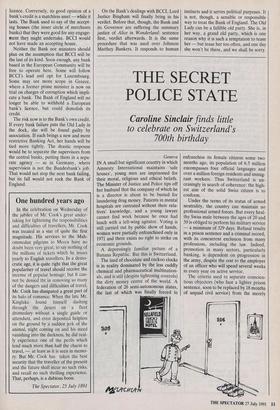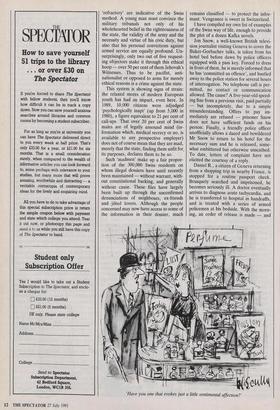THE SECRET POLICE STATE
Caroline Sinclair finds little
to celebrate on Switzerland's 700th birthday
Geneva IN A small but significant country in which Amnesty International maintains 'safe houses', young men are imprisoned for their moral, religious and ethical beliefs. The Minister of Justice and Police tips off her husband that the company of which he is a director is about to be busted for laundering drug money. Patients in mental hospitals are castrated without their rela- tives' knowledge, and a young lawyer cannot find work because he once had lunch with a left-wing agitator. Voting is still carried out by public show of hands, women were partially enfranchised only in 1971 and there exists no right to strike on economic grounds. A depressingly familiar picture of a Banana Republic. But this is Switzerland. The land of chocolate and cuckoo clocks is in reality dominated by the less cuddly chemical and pharmaceutical multination- als, and is still (despite tightening controls) the dirty money centre of the world. A federation of 26 semi-autonomous states, the last of which was finally forced to enfranchise its female citizens some two months ago, its population of 6.5 million encompasses four official languages and over a million foreign residents and immig- rant workers. Thus Switzerland is un- ceasingly in search of coherence: the high- est aim of the solid Swiss citizen is to conform.
Under the terms of its status of armed neutrality, the country can maintain no professional armed forces. But every heal- thy Swiss male between the ages of 20 and 50 is obliged to perform his military service — a minimum of 329 days. Refusal results in a prison sentence and a criminal record, with its concurrent exclusion from many professions, including the law. Indeed, promotion in many sectors, particularly banking, is dependent on progression in the army, despite the cost to the employer of an officer who will spend several weeks in every year on active service.
The criteria used to separate conscien- tious objectors (who face a lighter prison sentence, soon to be replaced by 18 months of unpaid civil service) from the merely
refractory' are indicative of the Swiss method. A young man must convince the military tribunals not only of his wholehearted belief in the righteousness of the state, the validity of the army and the necessity and virtue of his civic duty, but also that his personal convictions against armed service are equally profound. Un- surprisingly, only two out of five request- ing objectors make it through this ethical hoop — over 50 per cent of them Jehovah's Witnesses. Thus to be pacifist, anti- nationalist or opposed to arms for merely ethical reasons is a crime against the state.
This system is showing signs of strain: the relaxed mores of modern European youth has had an impact, even here. In 1989, 10,000 citizens were adjudged `psychologically inapt' (up from 5,000 in 1980), a figure equivalent to 21 per cent of call-ups. That over 20 per cent of Swiss males are of legally unsound mind (in- formation which, medical secrecy or no, is available to any prospective employer) does not of course mean that they are mad, merely that the state, finding them unfit for its purposes, declares them to be so.
Such 'madmen' make up a fair propor- tion of the 300,000 Swiss residents on whom illegal dossiers have until recently been maintained — without warrant, with- out constitutional backing, and generally without cause. These files have largely been built up through the unconfirmed denunciations of neighbours, ex-friends and jilted lovers. Although the people concerned may now have access to some of the information in their dossier, much remains classified — to protect the infor- mant. Vengeance is sweet in Switzerland.
I have compiled my own list of examples of the Swiss way of life, enough to provide the plot of a dozen Kafka novels.
Jon Snow, a well-known British televi- sion journalist visiting Geneva to cover the Baker-Gorbachev talks, is taken from his hotel bed before dawn by police officers equipped with a pass key. Forced to dress in front of them, he is merely informed that he has 'committed an offence', and hustled away to the police station for several hours of interrogation. No telephone call is per- mitted, no contact or communication allowed. The cause? A five-year-old speed- ing fine from a previous visit, paid partially — but incompletely, due to a simple misunderstanding. Offers to pay im- mediately are refused — prisoner Snow does not have sufficient funds on his person. Finally, a friendly police officer unofficially allows a dazed and bewildered Mr Snow to return to his hotel for the necessary sum and he is released, some- what embittered but otherwise unscathed. To date, letters of complaint have not elicited the courtesy of a reply.
Daniel R., a citizen of Geneva returning from a shopping trip in nearby France, is stopped for a routine passport check. Brusquely searched and imprisoned, he becomes seriously ill. A doctor eventually arrives to diagnose acute tachycardia, and he is transferred to hospital in handcuffs, and is treated with a series of armed policemen at his bedside. With the morn- ing, an order of release is made — and Have you one that evokes just a little sentimental affection?' countermanded in the strongest terms.
Despite the outraged protestations of his doctors, the patient is transferred to the prison wing of the hospital. The doctors demand a warrant of arrest, but none exists. Twenty-four hours after his capture, Daniel R. is freed without charge. His crime? He had forgotten to attend the final `repetition course' of his military service, ten years before.
A Rumanian 'Special Raporteur' for Amnesty International is severely tortured in his home in Geneva by the Rumanian Secret Police. His request for protection is refused by a senior Swiss police officer with the bland rejoinder, we cannot protect everyone, this is a city of dissidents.' It is indeed true that Geneva attracts dissidents from many countries, and that this unfor- tunate gentlemen is not one of those with diplomatic immunity through the United Nations. Nevertheless, his release from hospital is expedited not for medical reasons, but because his presence repre- sents a danger for the hospital authorities. He is currently being hidden, passed from one Amnesty safe house to another.
An Iranian dissident is forced off the road, dragged from his car and repeatedly shot. The perpetrators calmly return to their embassy and subsequently leave the country. The police do nothing — diploma- tic immunity cannot be infringed, and the victim is of course a non-citizen.
A young father goes to a maternity hospital to visit his wife who has been suffering from post-natal depression. To his consternation, he finds her bed empty, his child in the paediatric wing. She has been transferred, without his knowledge to a closed mental hospital. With enormous perseverance and effort, he eventually achieves her release into his care and that of an independent psychiatrist, who diag- noses her depression as chemically induced by the drugs that she has been given. Within a week, she is as sane as can be expected after such an experience. Eric Clausen, a civil servant, buys a house close to the border with France. Some months later, he discovers to his horror that, due to territorial adjustments agreed in 1953, his house is suddenly in France. Not only is the value of the property thus reduced by 75 per cent, but the mortgage is valid only for Switzerland and must be repaid in full. Shortly after- wards, the house burns to the ground; but the insurance likewise is valid only in Switzerland. The state had, of course, fulfilled its legal requirements: a letter had been circulated in 1950, announcing the change to come in 30 years time. Nothing was inscribed in the land registers until the treaty came into effect. The Swiss com- mune where the house was previously situated is still, ten years later, claiming local taxes from its aggrieved owner.
Stanley Adams, a British executive for Hoffman La Roche, received a 20-year prison sentence for industrial espionage. His wife commits suicide, his assets are seized. His espionage activities? Informing the European Commission that the com- pany was involved in illegal price rigging. Following an accident, an ambulance takes a seriously injured man to the nearest hospital, which happens to be private. Unfortunately, he is insufficiently insured. While the ambulance drivers try to per- suade the doctors to admit him, he dies. The hopsital receives a written reprimand, and the case is closed.
A woman is eating in a restaurant with her child, to whose father she is not married, when seven policemen enter and forcibly remove the infant. Her natural maternal reaction to this outrage permits the police psychiatrist, doubtless invited along for the ride, to pronounce her incompetent and have her immediately committed. The child instantly becomes a ward of the state. To regain her lost parental rights, the quickly released mother must sue for them, a long and expensive procedure. Why? Her neigh- bours were afraid that she was 'unable to cope'.
LIVING in such a country, as I do, can at times be like a waking nightmare. By law, all noise must stop at ten o'clock at night. Nonetheless, when friends who live in a terraced house invited all their neighbours to a party so as to avoid any unpleasant- ness, they did not expect that, following the farewells of the neighbours on the stroke of ten, the police would be on the doorstep at 10.20. Nor did others antici- pate that, placing flower-pots on the bal- cony at 8.30 one evening, the police would arrive at 9.30 the following morning with a reported suspicion that the brackets did not comply with local planning require- ments.
When a Swiss who lived next door to another of my friends oh-so casually men- tioned that, if their lawn were not mown, someone would call the police, no ill feeling was intended, he was merely stating a fact. I have found it similarly disconcert- ing to discover when signing the lease for a flat, that gentlemen on the premises are required to urinate in a seated position after 10 p.m.
In aggregate, the Swiss civil and criminal codes are orientated not to the needs of the individual, but to the minimisation of that individual's impact on the state and on society.
Switzerland maintains its armed neutral- ity in glorious isolation. Not a member of the United Nations, it is only a signatory to the International Convention on Human Rights with express reservations, it was unable to ratify the International Conven- tion for the Rights of the Child, and, despite its tentative approaches, will be unable to join the European Community in the near future without risk of continual prosecutions in the European Court.
August 1 is the 700th anniversary of the founding of the Swiss state. Happy birth- day.




















































 Previous page
Previous page